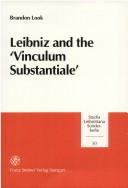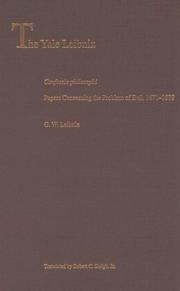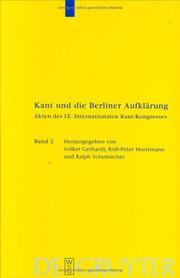| Listing 1 - 7 of 7 |
Sort by
|
Book
ISBN: 9780199606368 Year: 2021 Publisher: Oxford Oxford University Press
Abstract | Keywords | Export | Availability | Bookmark
 Loading...
Loading...Choose an application
- Reference Manager
- EndNote
- RefWorks (Direct export to RefWorks)
Book
ISBN: 1472524853 1472531515 9781472524850 9781472531513 0826429750 1472523520 1306846358 1441102353 1441135545 9781472523525 Year: 2014 Publisher: London : Bloomsbury Academic,
Abstract | Keywords | Export | Availability | Bookmark
 Loading...
Loading...Choose an application
- Reference Manager
- EndNote
- RefWorks (Direct export to RefWorks)
With entries written by leading scholars in the field of Modern Philosophy, this is a complete one-volume reference guide to Leibniz's life, thought and work. G.W.F. Leibniz (1646-1716) was one of the great polymaths of the modern world. As well as being among the greatest Rationalist metaphysicians of the post-medieval age, he built the first mechanical calculator capable of multiplication and division, and developed the binary, base-two system. As a physicist, he made advances in mechanics, coining the term 'kinetic energy'. As a mathematician, Leibniz invented calculus independently of Newton, and it is his notation, not Newton's, which is used to this day. Perhaps best known for the atomic concept of the monad, Leibniz also made outstanding contributions to symbolic logic, aesthetics, history, linguistics, and political theory. With entries written by leading scholars in the field of Modern Philosophy, this Companion is an accessible and authoritative reference guide to Leibniz's life, work and. The book includes extended biographical sketches, a time line and an up-to-date annotated bibliography. Gathering all these resources, this book will be an extremely valuable tool for those interested in Leibniz and the era in which he wrote. "The Continuum Companions" series is a major series of single volume companions to key research fields in the humanities aimed at postgraduate students, scholars and libraries. Each companion offers a comprehensive reference resource giving an overview of key topics, research areas, new directions and a manageable guide to beginning or developing research in the field. A distinctive feature of the series is that each companion provides practical guidance on advanced study and research in the field, including research methods and subject-specific resources.
Leibniz, Gottfried Wilhelm, --- Philosophers --- Philosophy, German --- History

ISSN: 03410765 ISBN: 3515076239 9783515076234 Year: 1999 Volume: 30 Publisher: Stuttgart: Steiner,
Abstract | Keywords | Export | Availability | Bookmark
 Loading...
Loading...Choose an application
- Reference Manager
- EndNote
- RefWorks (Direct export to RefWorks)

ISBN: 0300089589 9780300089585 Year: 2005 Publisher: New Haven (Conn.): Yale university press,
Abstract | Keywords | Export | Availability | Bookmark
 Loading...
Loading...Choose an application
- Reference Manager
- EndNote
- RefWorks (Direct export to RefWorks)
This volume contains papers that represent Leibniz’s early thoughts on the problem of evil, centering on a dialogue, the Confessio philosophi, in which he formulates a general account of God’s relation to sin and evil that becomes a fixture in his thinking. How can God be understood to be the ultimate cause, asks Leibniz, without God being considered as the author of sin, a conclusion incompatible with God’s holiness? Leibniz’s attempts to justify the way of God to humans lead him to deep discussion of related topics: the nature of free choice, the problems of necessitarianism and fatalism, the nature of divine justice and holiness. All but one of the writings presented here are available in English for the first time.
God. --- Theodicy. --- Free will and determinism. --- Dieu --- Théodicée --- Libre arbitre et déterminisme --- Théodicée --- Libre arbitre et déterminisme --- God --- Theodicy --- Free will and determinism --- Evil, Problem of (Theology) --- Permissive will of God --- Problem of evil (Theology) --- Good and evil --- Metaphysics --- Misotheism --- Monotheism --- Religion --- Theism --- Compatibilism --- Determinism and free will --- Determinism and indeterminism --- Free agency --- Freedom and determinism --- Freedom of the will --- Indeterminism --- Liberty of the will --- Determinism (Philosophy) --- Permissive will --- Will, Permissive --- Political philosophy. Social philosophy --- History of philosophy --- Religious studies
Book
ISBN: 1281728829 9786611728823 0300138091 9780300138092 9780300118049 030011804X 9781281728821 Year: 2007 Publisher: New Haven (Conn.): Yale university press,
Abstract | Keywords | Export | Availability | Bookmark
 Loading...
Loading...Choose an application
- Reference Manager
- EndNote
- RefWorks (Direct export to RefWorks)
This volume is a critical edition of the ten-year correspondence (1706-1716) between Gottfried Wilhelm Leibniz, one of Europe’s most influential early modern thinkers, and Bartholomew Des Bosses, a Jesuit theologian who was keen to bring together Leibniz’s philosophy and the Aristotelian philosophy and religious doctrines accepted by his order. The letters offer crucial insights into Leibniz’s final metaphysics and into the intellectual life of the eighteenth century. Brandon C. Look and Donald Rutherford present seventy-one of Leibniz’s and Des Bosses’s letters in the original Latin and in careful English translation. Few of the letters have been translated into English before. The editors also provide extensive annotations, deletions, and marginalia from Leibniz’s various drafts, and a substantial introduction setting the context for the correspondence and analyzing the main philosophical issues.
Philosophers --- Leibniz, Gottfried Wilhelm, --- Des Bosses, Barthélémy, --- Des Bosses, Bartholomaeus --- Des Bosses, Barthélémy --- Des Bosses --- Leibnitz, Gottfried Wilhelm --- Leibniz, Gottfried Wilhelm --- Philosophes --- Correspondence. --- Des Bosses, Barthélémy, --- Philosophers - Germany - Correspondence --- Leibniz, Gottfried Wilhelm, - Freiherr von, - 1646-1716 - Correspondence --- Des Bosses, Barthélémy, - 1663-1738 - Correspondence --- Leibniz, Gottfried Wilhelm, - Freiherr von, - 1646-1716 --- Des Bosses, Barthélémy, - 1663-1738 --- Des Bosses, Barthelemy,
Digital

ISBN: 9783110651546 9783110648287 9783110648263 Year: 2019 Publisher: Berlin ;; Boston De Gruyter
Abstract | Keywords | Export | Availability | Bookmark
 Loading...
Loading...Choose an application
- Reference Manager
- EndNote
- RefWorks (Direct export to RefWorks)


ISBN: 9783110874129 9783110169799 Year: 2014 Publisher: Berlin ;; Boston De Gruyter
Abstract | Keywords | Export | Availability | Bookmark
 Loading...
Loading...Choose an application
- Reference Manager
- EndNote
- RefWorks (Direct export to RefWorks)
| Listing 1 - 7 of 7 |
Sort by
|

 Search
Search Feedback
Feedback About UniCat
About UniCat  Help
Help News
News